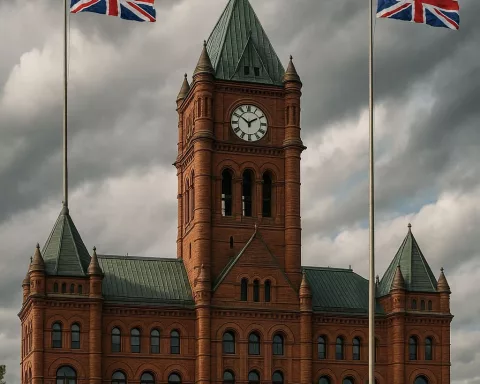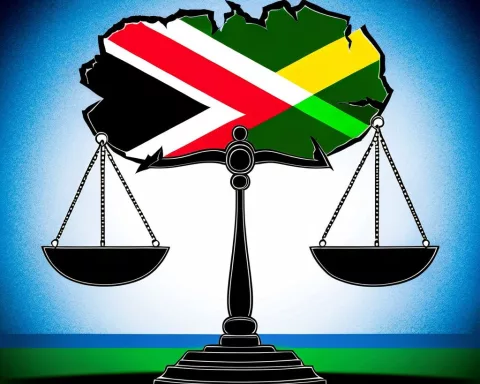The resignation of Ghaleb Cachalia, a prominent member of the Democratic Alliance (DA) in South Africa, has caused a shockwave in the country’s politics. Cachalia’s decision to leave the party is believed to be due to its shift towards authoritarianism and a departure from democratic values. The DA has responded by reaffirming its commitment to peace and a two-state solution in the Middle East conflict, while highlighting the need to respect differing opinions within the party. The incident reveals the challenge of balancing personal beliefs with party policies in South African politics.
A Shockwave in South African Politics: Ghaleb Cachalia’s Resignation. South Africa’s political landscape was jolted by the news that Ghaleb Cachalia, a distinguished member of the Democratic Alliance (DA), had chosen to step down from his role as a Member of Parliament and relinquish his party membership.
The Unraveling of a Political Career
South Africa’s political landscape was jolted by the news that Ghaleb Cachalia, a distinguished member of the Democratic Alliance (DA), had chosen to step down from his role as a Member of Parliament and relinquish his party membership. This development has further stirred South African politics, which has been experiencing turbulence for a long time. Cachalia’s decision to exit the DA is believed to stem from the party’s perceived movement towards dysfunctionalism, authoritarianism, and a departure from democratic values.
Cachalia’s decision to leave the DA did not happen in isolation. It is the end product of a year filled with controversy due to his stance on the ongoing Middle East conflict. His role as the DA’s public enterprises spokesperson was terminated in November due to his support for Palestine, marking a dramatic end to an already volatile period. The party insisted that his expressed views violated a resolution that outlined the DA’s position on the Middle East conflict.
The Domino Effect: Resignation and its Aftermath
In his formal resignation statement, Cachalia offered a comprehensive account of his motivations for severing ties with the DA. His exhaustive explanation sheds light on the growing discord between his personal beliefs and the party’s policy that has escalated over the past few months. His public comments on the Gaza war appear to be central to this discomfort. Cachalia argued that his vocal stance on the Middle East conflict cost him his position in the shadow cabinet, a move he viewed as unrelated to his previous portfolio. Moreover, he suggested that his comments on the issue led to a falling out with the party, overstepping a caucus directive that only allowed the shadow minister for international relations and cooperation to comment on the matter.
In turn, the DA responded to his departure by reaffirming their commitment to peace, a two-state solution, and the establishment of a sovereign and unoccupied Palestine co-existing peacefully alongside a secure Israel. The DA’s National Spokesperson, Solly Malatsi, recognized the difference of opinions within the party but emphasized the need to respect the party’s decision-making process.
The DA’s Response: Disparate Views and Mutual Respect
Malatsi highlighted that the DA is a hub of individuals with differing opinions, welcoming “members from all walks of life.” He pointed out that these diverse perspectives often find a voice within the party’s numerous caucuses, thanks to an environment of mutual respect. However, he made it clear that this respect did not extend to Cachalia, accusing him of disrespecting the party’s processes, his colleagues, and the spectrum of opinions within the party. This culminated in Cachalia’s infringement of a caucus decision that appointed the party’s shadow minister for international relations and cooperation as the official spokesperson on the Gaza war.
Moreover, the DA dismissed Cachalia’s critiques aimed at the party’s coalition partners and civil society supporting the Multi-Party Charter, as well as his criticism of DA’s systems and processes. His efforts to hold DA Leader John Steenhuisen accountable for his resignation were also countered, with Malatsi reminding that Cachalia had publicly praised Steenhuisen less than a year ago on his social media platforms.
The Aftermath: A Deeper Tension Revealed
Essentially, Cachalia’s departure from the DA reveals a deeper conflict within the party – the challenge to harmonize a variety of perspectives with a common party position. This incident, mirroring the complexities of South African politics, serves as a stark reminder of the intricate interplay between personal beliefs and party policies, and the delicate equilibrium needed to successfully navigate such a terrain.
1. Who is Ghaleb Cachalia and why did his resignation cause a shockwave in South African politics?
Ghaleb Cachalia is a prominent member of the Democratic Alliance (DA) in South Africa who recently resigned from his role as a Member of Parliament and relinquished his party membership. His resignation caused a shockwave as it is believed to be due to the party’s shift towards authoritarianism and a departure from democratic values.
2. What is the reason behind Cachalia’s decision to leave the DA?
Cachalia’s decision to exit the DA is believed to stem from the party’s perceived movement towards dysfunctionalism, authoritarianism, and a departure from democratic values. His role as the DA’s public enterprises spokesperson was terminated in November due to his support for Palestine, which led to a dramatic end to an already volatile period.
3. What was the aftermath of Cachalia’s resignation?
In response to his departure, the DA reaffirmed their commitment to peace and a two-state solution in the Middle East conflict while highlighting the need to respect differing opinions within the party. However, they also accused Cachalia of disrespecting the party’s processes and his colleagues, leading to a deeper tension revealed within the party.
4. What is the DA’s stance on the Middle East conflict?
The DA’s stance on the Middle East conflict is to support a two-state solution with the establishment of a sovereign and unoccupied Palestine co-existing peacefully alongside a secure Israel.
5. How does the DA handle disparate views within the party?
The DA welcomes members from all walks of life and recognizes the diversity of perspectives within the party, often finding a voice within their numerous caucuses, thanks to an environment of mutual respect. However, this respect does not extend to those who infringe on caucus decisions or disrespect the party’s processes.
6. What is the lesson from Cachalia’s resignation?
Cachalia’s departure from the DA serves as a stark reminder of the intricate interplay between personal beliefs and party policies and the delicate equilibrium needed to successfully navigate such a terrain. It also highlights the challenge of harmonizing a variety of perspectives with a common party position.












